Back
How to List on Airbnb: A Guide to Creating a Successful Listing

Written by:
Jeremy Werden
March 26, 2024
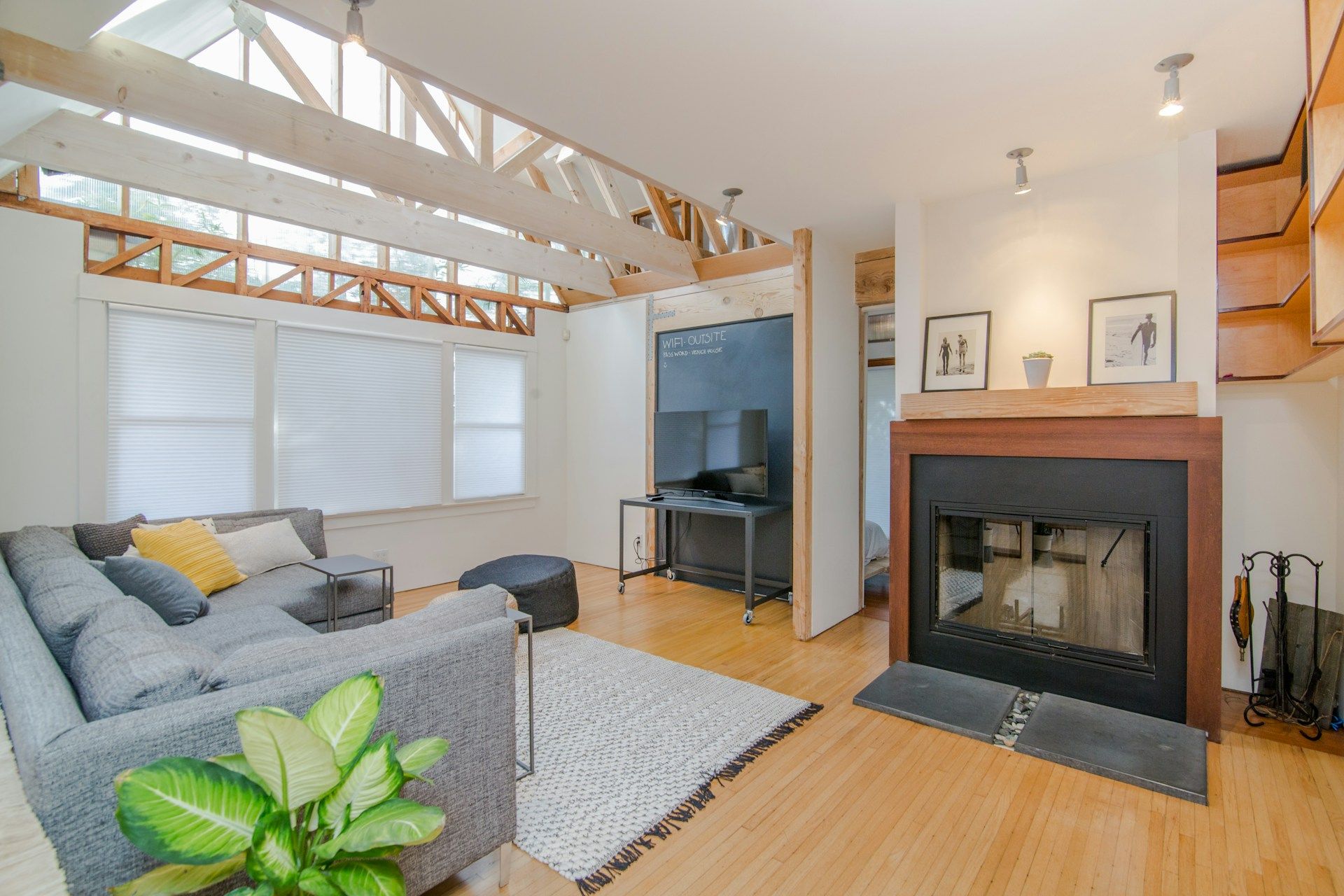
⚡️
Reveal any property's Airbnb and Long-Term rental profitability
Buy this property and list it on Airbnb.
Thinking about renting out your spare room or house on Airbnb? It might seem overwhelming at first, but it doesn’t have to be. In this beginner's guide, we’ll walk you through everything you need to know to get your property listed on Airbnb.
Many new hosts don’t even know where to begin, but don’t worry—we’ve got you covered. Our team of Superhosts will guide you step-by-step, from everything you need to prepare, to publishing a standout listing. By the end, you'll be ready to welcome your first guests!
What Do You Need to List Your Property on Airbnb?
Let's start with the most obvious question, what do you need to list your property on Airbnb? Well, it mainly depends on where your property is located. For the most part, Airbnb allows anyone to host on the platform, all you need to do is create an account and switch to hosting mode to begin.
However, you might need to prepare a couple of important documents or paperwork before you can start to legally host on the Airbnb platform.
Essential Documents for Your Airbnb Listing
As we've already mentioned, the requirements aren't necessarily the same across different locations. However, here are some of the basics that you'll need to prepare, regardless of where your rental is located.
- Verify Your Identity: You'll be required to verify your identity before you can accept bookings or make your listing. This is done for a variety of reasons like building trust between hosts and guests and promoting the safety of all parties involved. It also adds to your validity as an Airbnb host. You'll typically be required to submit your personal information like name, date of birth, and address. You'll also need to prepare a government ID like a passport, driver's license, or national card to submit to the platform.
- Prepare Your Business Information: There are specific locations where it is required by law to validate your business registration details before an Airbnb listing is published. To be fair, before creating a rental listing on Airbnb, you should already have your STR business registered with all of the necessary government entities. Your business registration details like country of registration, registration number, legal business name, business address, and contact details may be asked.
- Provide Your Tax Information: Some jurisdictions require Airbnb to collect taxes or report tax information about your property and business. So, they'll be asking for relevant tax information and tax registration details whenever appropriate.
- Secure Local Permits: Finally, you'd also need to secure local permits from different authorities, depending on your exact location. For example, STR regulations in Florida require hosts to acquire a license from the Department of Business and Professional Regulation (DPBR) to get started. Hosts in Raleigh must obtain a zoning permit for their short-term rental. Again, laws can differ between countries and even states, so make sure to check out your local short-term rental regulations to be safe.
Preparing and processing these essential documents before your listing goes live ensures that you are worry-free from all requirements and can focus on simply running your business.
Understanding the Cost to List on Airbnb
For those just starting out, you may be wondering "How much does it cost to create a new listing?" Well, let us be the first to tell you that it's free to publish your home or apartment on Airbnb. However, you do need to pay the platform somehow, and those fees start to come in once guests book your property.
There are two main fee structures for those offering accommodations on Airbnb:
- Split Fee: This is the most common option. Hosts typically pay around 3% of the booking subtotal (the nightly rate plus any additional fees, excluding taxes). Guests also pay a service fee, usually up to 14.2% of the booking subtotal.
- Host-only Fee: In this model, the host covers the entire service fee, which ranges from 14% to 16% of the booking subtotal. This option is often used by hotels or hosts using a property management system.
The split fee is typically more common for individuals in countries like the U.S., Canada, and Mexico while the host-only fee is more common in Asia and Europe.
If you're looking to keep your direct costs low and don't mind guests seeing an extra service fee at checkout, the split-fee model might be best for you. However, if you want to offer a more transparent pricing experience and potentially boost bookings by eliminating visible guest fees, you may consider switching to the host-only fee model—just be sure to adjust your nightly rates accordingly to cover the higher host fees.
How to Create a Listing on Airbnb: A Step-By-Step Guide
Honestly, listing on Airbnb is easy, take it from us, we manage over 25 successful short-term rentals across the U.S. So, in this section, we'll take you through a step-by-step guide on how to list your entire place on Airbnb.
These steps are specifically for listing a property using the Airbnb mobile app. However, the steps would be pretty identical if you were to create one on the browser version.
- Open the Airbnb app and create an account. You'll need to supply your personal information and contact details here. We also recommend directly verifying your identity if possible for a smoother process moving forward.
- Click on the "Profile" icon and click on the "List your Space" section under "Hosting." Click on the "Get Started" button to proceed.
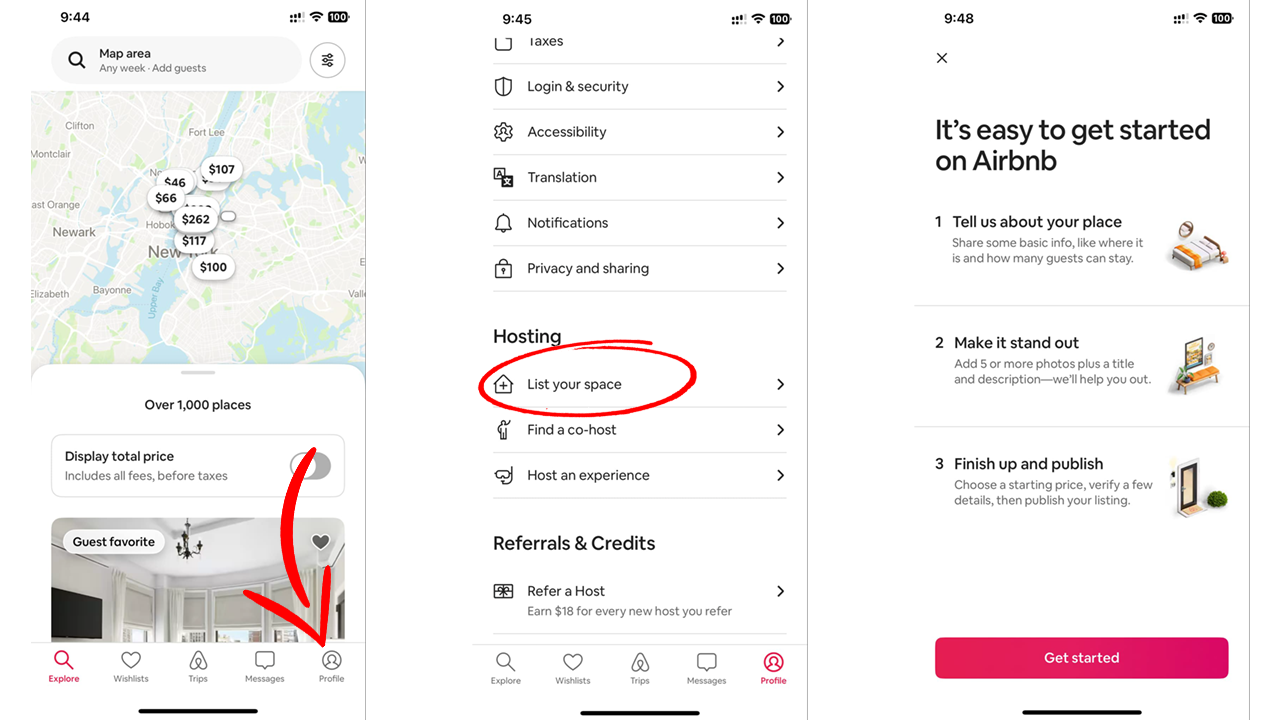
- The first section requires you to tell Airbnb about your place. You'll need to provide details like location, the type of property, and whether it's a shared room, private room, or an entire property. You'll also be asked to provide how many guests may stay. It will also ask you about the maximum number of guests you can accommodate, and the number of bedrooms, bathrooms, and beds.
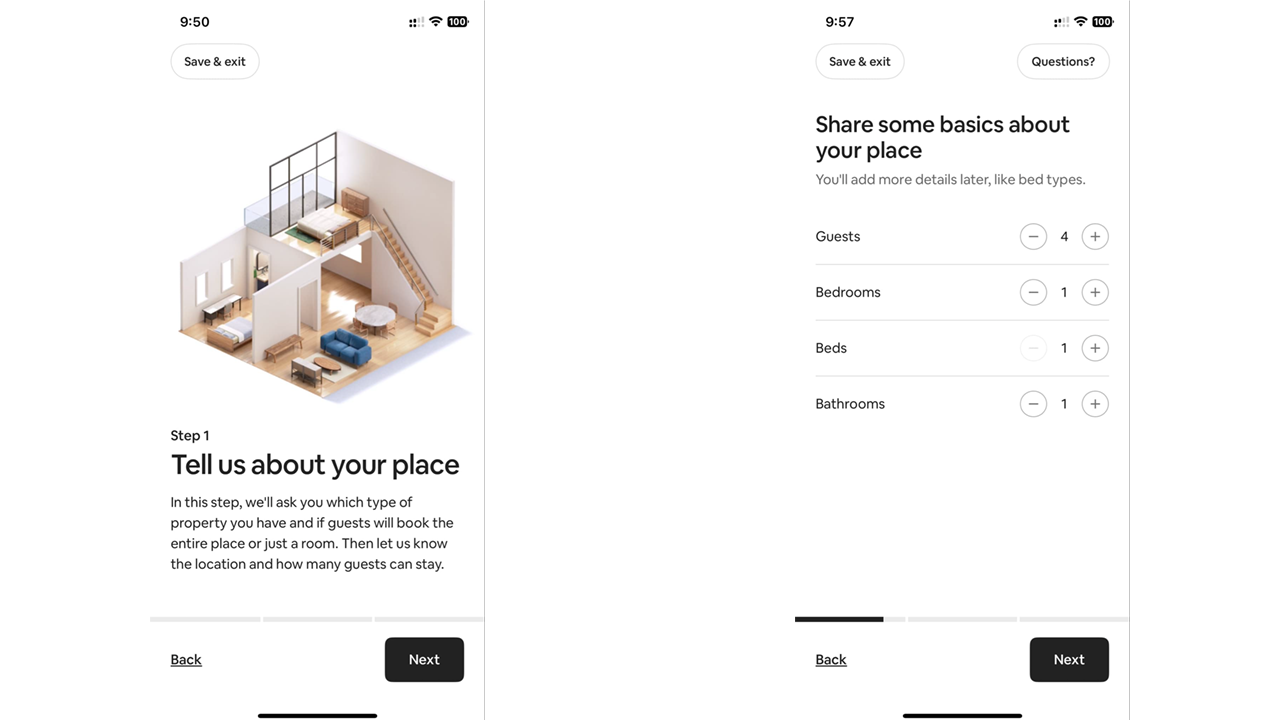
- The next section is the core of your listing. It asks for your amenities, photos of the place, along with a title and the description. The app only requires you to add 5 photos, however, we do recommend adding as many as you can to present every aspect of your property in full detail. We also recommend using high-quality images, catchy and descriptive titles, and providing a full description of your property to help you get in more searches, and improve your overall Airbnb SEO. For more tips, check out our insider tips to create better listings.
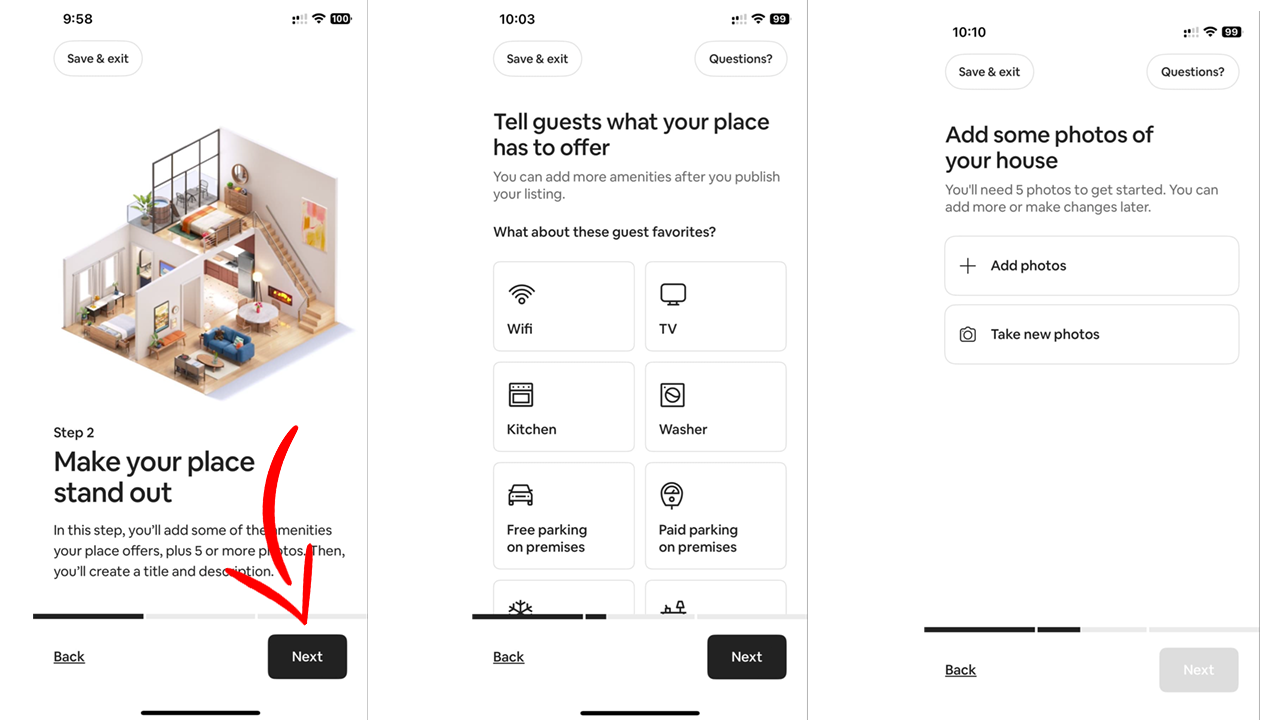
- The final section is when you improve your Airbnb listing and add the finishing touches. Here you'll select your price, add discounts, and declaration of security cameras or weapons on the property.
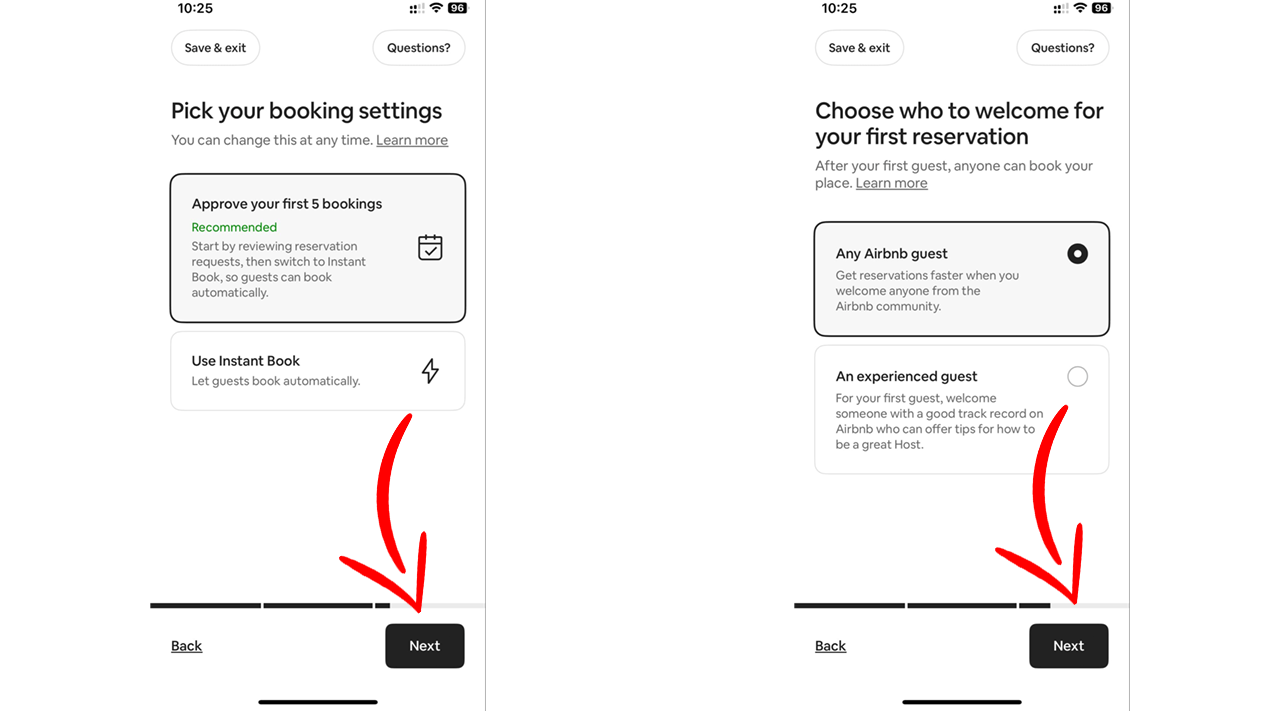
- The last step simply involves reviewing your listing and hitting the "Publish" button to make it live.
If you ever leave at any point in the listing creation process, you can easily get back to it. By default, you'll be in the "traveling" mode of the app. You'll need to switch to "hosting" mode to find the draft of your listing by clicking on your profile and clicking on the "Hosting button."
Those are all the things you need to do to create a listing for your vacation rental. The hard part is making your listing show up in searches and letting guests know that you actually offer rental services. However, that's
What Are Airbnb Listing Requirements?
Airbnb requires some specific yet simple policies before you can list your rental. This can vary depending on your country, but in most cases, the following guidelines apply:
- Age and Eligibility - First things first: you must be at least 18 years old to create a listing on Airbnb. This is a non-negotiable rule, so make sure you meet the age requirement before diving in.
- Accuracy and Transparency - Be upfront and honest about what you're offering. Guests rely on accurate descriptions and clear details when booking. This means sharing the correct address, contact information, and specifics about your property. Misleading details or false claims can not only lead to bad reviews but could also get your listing removed. Think of it as setting expectations—guests should know exactly what they’re walking into.
- Compliance with Local Laws - Every region has its own rules when it comes to short-term rentals. Some cities require hosts to have permits or licenses, while others may have zoning restrictions that limit where you can host. It’s your responsibility to understand and comply with these local regulations. Ignoring them could result in fines or even legal trouble, so do your homework!
- Quality Standards - Guests expect a certain level of quality when they book through Airbnb, so your property should meet basic hospitality standards if you want to keep it on the platform. Cleanliness is key—no one wants to stay in a dirty or poorly maintained space. Make sure everything is in working order and that your property is well-kept for each new guest.
- Safety Requirements - Safety is non-negotiable. Equip your property with basic safety features like smoke detectors, fire extinguishers, and emergency contact info. These small steps not only protect your guests but also give them peace of mind during their stay.
- Acceptable Content - Your listing’s photos and descriptions are the first things potential guests will see, so make sure they follow Airbnb’s content policy. Avoid anything inappropriate or offensive—it’s important to keep things professional and welcoming.
- Host Responsiveness - Communication is everything in the hospitality business. Guests appreciate hosts who are quick to respond to inquiries and booking requests. Being prompt builds trust and shows that you’re serious about providing a great experience. If you can't keep up with the demand, we recommend using guest messaging software for Airbnb to help you streamline your guest communication.
- No Discrimination - Airbnb has a strict no-discrimination policy, which means you cannot refuse guests based on race, ethnicity, religion, gender, sexual orientation, or any other protected characteristic. Inclusivity is key—everyone deserves the chance to enjoy your space.
- Responsible Hosting - Hosting isn’t just about providing a place to sleep—it’s about creating a memorable experience for your guests. Airbnb expects Hosts to be respectful, address any issues that arise during their stay promptly, and aim for positive interactions that leave guests wanting to return.
- Payment and Payouts - Lastly, make sure you’ve set up a valid payment method through Airbnb’s platform so you can receive payouts smoothly after each booking. Familiarize yourself with their payment processing rules so there are no surprises when it comes time for payday.
Wrapping Things Up
Hopefully, we helped aspiring hosts and property managers learn how to list rentals on Airbnb. We know the process can be daunting at first, but once you know the steps and follow the platform's guidelines, it'll be nothing but smooth sailing. Remember, the most successful Airbnb listings aren't just about renting out a space; they're creating memorable descriptions, highlighting photos of their rental, and turning their properties into welcoming experiences right from the get-go.
Use our BNBCalc Airbnb calculator to help you decide whether it's worth it to create a listing and rent out your home on Airbnb. It displays important financial metrics, based on historically-backed data and nearby active comparables to help you make data-driven decisions.
⚡️
Reveal any property's Airbnb and Long-Term rental profitability
Buy this property and list it on Airbnb.